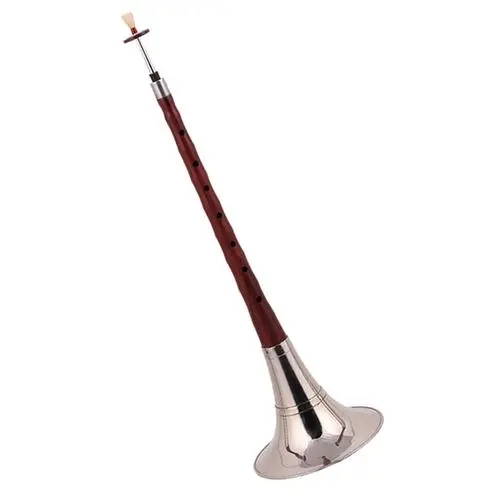Jia Pengcheng: The sound of suona conveys nostalgia
In the dead of night, whenever passing the building of Zhidan County Culture and Art Training Center, the melodious sound of the qin dances in the air like musical notes, sometimes like the ding-dong of spring water, the lingering of running water; The touching sound of the piano lingered in the ear, always making people unconsciously slow down.

The sound of the qin came from the room of Jia Pengcheng, an instrumentalist at the Zhidan County Cultural and Art Training Center. Jia Pengcheng was born in Loubian Village, Matigou Town, Zizhou County, Yulin City in 1979. He loved literature and art since he was a child, and he followed his father and older brother to learn national percussion music and suona in northern Shaanxi. From 2005 to 2006, by chance, he received the careful guidance of Zuo Jicheng, a famous suona educator at the China Conservatory of Music, and Wang Gaolin, a national first-class suona performer at the Shanxi Provincial Song and Dance Theater, and his playing skills have become increasingly sophisticated.
Today, Jia Pengcheng is good at suona, pipe, ka, whistle and other musical instruments. In 2008, he won the "Excellent Performance Award" in the first Peasant Drama Festival; in 2009, in the fourth small opera performance in Yan'an City, the suona and dance "When the Red Army's Brother Comes Back" won the first prize; in 2020, fusion The vocal instrumental music "Yan'an Red" won the 9th Shaanxi Arts Festival Star Award and so on.
In Jia Pengcheng's room, a calligraphy and painting of "Born for Art, Die for Art" is particularly conspicuous. In the days when there is no performance, after the unit rehearsal, he locks himself in the room to study hard and practice hard for 6 hours a day.
"Can Lao Jia Lianqin be a meal? Isn't it tiring to stick to this for 6 hours a day?" Facing his friend's question, Jia Pengcheng bowed his head and smiled, "Because art has completely become my soul, you can stop me from eating for three days, But if I don't play the suona for three days, I feel like a flower that is about to wither."
Behind the persistent pursuit of art, Jia Pengcheng endured the unbearable loneliness of ordinary people. Due to his obsession with art, he spends less and less time with his family, and his wife can't stand this situation and finally chooses to break up.
Facing the incomprehension of his family, Jia Pengcheng climbed to the top of Taiping Mountain, facing the mountain, regardless of the sky and the ground, blowing the suona, the unrestrained folk songs of northern Shaanxi, and the melodious sound of the suona echoed in the mountains with the wind.
Suona is a traditional instrumental music used by people in northern Shaanxi to express joy, anger, sadness and music. However, due to the influence of various factors such as the examination system, parents generally have the idea of valuing literature over art, and fewer and fewer people learn to play suona.
In order to carry forward the art and culture of suona, Jia Pengcheng is also actively looking for good seedlings and cultivating successors while training hard. This year's Lantern Festival, he took his well-trained apprentice Wang Yusen to blow the suona on the "Yan'an Big Stage". When the audience burst into applause and saw the 8-year-old apprentice perform so wonderfully, his face was filled with joy. Filled with a happy smile.
As Jia Pengcheng said: "No matter what you choose, you have to pay a price. No matter whether others understand it or not, once you choose, you will definitely do it well and carry forward the art and culture of suona." The love of suona traditional culture is admirable.
 渝公网安备 50010702504639号
渝公网安备 50010702504639号